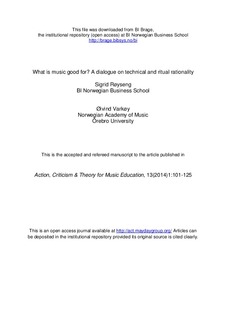| dc.contributor.author | Røyseng, Sigrid | |
| dc.contributor.author | Varkøy, Øivind | |
| dc.date.accessioned | 2016-02-02T10:15:34Z | |
| dc.date.available | 2016-02-02T10:15:34Z | |
| dc.date.issued | 2014 | |
| dc.identifier.citation | Action, Criticism & Theory for Music Education, 13(2014)1:101-125 | nb_NO |
| dc.identifier.issn | 1545-4517 | |
| dc.identifier.uri | http://hdl.handle.net/11250/2375646 | |
| dc.description | This is an open access journal available at http://act.maydaygroup.org/ | nb_NO |
| dc.description.abstract | In different ways and in different contexts it has been and still is argued that music education should be prioritized because of its positive impact on pupils in terms of general development as good citizens and in terms of skills in other disciplines. In this article, the authors discuss whether this tendency is best interpreted as an example of technical or ritual rationality. Rather than presenting a univocal argument for one of the interpretations, they explore what arises when the two interpretations meet each other in a dialogue. The ways in which music education is legitimized is closely related to the values that are assigned to music and musical experiences. An important focus of this article is the different valuations of music that different ways of interpreting the legitimization of music education imply. Keywords: technical rationality, ritual rationality, music education, citizenship | nb_NO |
| dc.language.iso | eng | nb_NO |
| dc.publisher | Mayday Group | nb_NO |
| dc.title | What is music good for? A dialogue on technical and ritual rationality | nb_NO |
| dc.type | Journal article | nb_NO |
| dc.type | Peer reviewed | nb_NO |
| dc.source.journal | Action, Criticism & Theory for Music Education | nb_NO |
| dc.description.localcode | 1, OA | nb_NO |
